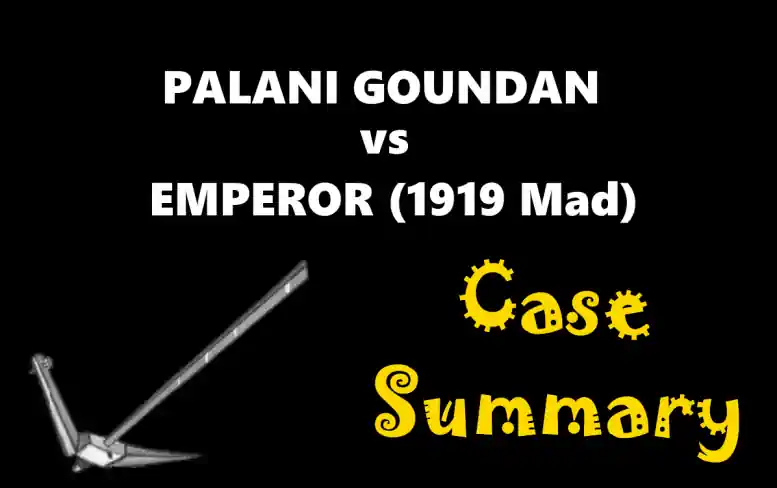PALANI GOUNDAN vs EMPEROR case was being tried in the Sessions Court where it was held that the accused is to be liable for committing murder of his wife as per Section 300 of Indian Penal Code, 1860. Further on appeal, the Honorable Madras High court overruled the judgment passed by the Sessions Court and held that the accused was not be charged for murder or culpable homicide.
BENCH: J WALLIS, S AIYAR, C TROTTER
BRIEF FACTS:
- In the instant case, the accused has been charged with committing murder of his wife. The prosecution witness admitted that on the 23rd of October 1918, the deceased was found weeping and was subjected to domestic violence. As per the evidence of the witnesses, the mother and the brother of the accused were found in the vassal, and that the mother was remonstrating with her son saying, ‘do not beat a woman’. They also confessed that they did not hear any cries at that moment, but later, when the accused opened the door, they found the deceased lying dead on the floor with the ploughshare lying nearby.
- The facts revealed the accused struck his wife a violent blow on the head with the ploughshare rendering her unconscious and later intended to create false evidence as to the cause of death, considering her to be dead, trying to conceal his own crime.
- In order to prevent himself from being charged, the accused and his mother attempted to narrate a false version of the occurrence of the crime which was impossible to believe as the medical evidence clearly stated that the woman had received a severe blow on the side of her head, which would probably have rendered her unconscious, and also shows that she died of strangulation, which may have been the effect of hanging.
Buy Best Book of IPC by K.D. Gaur (Latest Edition)
ISSUES :
- Whether the act of accused amounts to murder under Section 300 of the Indian Penal Code, 1860?
- Whether the accused had an intention of causing murder?
- Whether it can convict the accused of culpable homicide under Section 299 of the Indian Penal Code?
RATIO :
In India, every offence is defined, both what must be done and with intention, it must be done, by the section of the Penal Code which creates it a crime. There are certain general exceptions laid down in Chapter IV, but none of them fit the present case.
Section 299 of the Indian Penal Code, 1860, deals with Culpable homicide. It says-
“Whoever causes death by doing an act with the intention of causing death, or with the intention of causing such bodily injury as is likely to cause death, or with the knowledge that he is likely by such act to cause death, commits the offence of culpable homicide.”
Section 300 of the Indian Penal Code, 1860, deals with the offence of murder. It says-
“Except in the cases hereinafter excepted, culpable homicide is murder, if the act by which the death is caused is done with the intention of causing death, or if it is done with the intention of causing such bodily injury to any person and the bodily injury intended to be indicted is sufficient in the ordinary course of nature to cause death.”
The above-mentioned sections not only consider the act of causing death but also the state of mind regarding which the act has been done. Thus, the intention, knowledge, and recklessness directed towards an act of causing death must be considered.
Buy IPC Bare Act (Latest Edition)
JUDGEMENT :
In the light of the above discussions, the conclusion is irresistible that the intention of the accused must be judged, not in the light of the actual circumstances, but in the light of what he is supposed to be the circumstances.
The court observed that the cause of death of the deceased was asphyxiation by hanging and the accused had no intention of causing death while giving a blow on her head. Hence, no mens rea was being found on the part of the accused. Therefore, the judgment of the Sessions Court was being overruled by the Honorable High Court and was held that the accused cannot be convicted either of murder or culpable homicide, but definitely, be punished for committing an assault on his wife and also for attempting to create false evidence by hanging her.
Found this case summary useful? Check out other landmark IPC Case summaries here >>> IPC Case Summaries





